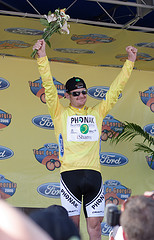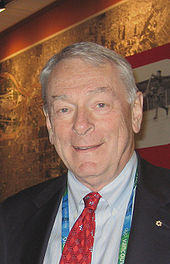 Whatever else you might think of Floyd Landis, you’ve gotta give him this—the dude does not hedge.
Whatever else you might think of Floyd Landis, you’ve gotta give him this—the dude does not hedge.
In 2006, he was totally and completely innocent—a clean rider from a pair of clean teams, mistakenly charged. “Positively False” was his now-smirkingly-appropriate campaign mantra. Then last year, his confessed his unequivocal guilt, and went on to catalogue in detail the transgressions of essentially every other cyclist he knew.
The past 24 hours produced a similarly unflinching turnaround. Yesterday, Landis announced he was retired. Among other choice soundbites from the de-jerseyed TdF champ: cleaning up cycling is “not my fight”; trying to get back into the sport is “more stress than it’s worth”; and finally, “I’m relatively sure this sport cannot be fixed, but that’s not my job”.
But then today? “[Y]ou’ve got to legalize doping“; “Just start over and let it be”; “Good people dope, bad people dope it’s just the way it was and the offence is not greater if you are an asshole or a saint”; “Monitor it and make sure people don’t hurt themselves”. Why, if the boy hadn’t just told me otherwise, I’d say he was was stressing about some sort of fight to fix the sport.
While I do like that Floyd is thinking outside the box, when a convicted doper claims “everybody else dopes and no one ever gets caught”, I still tend to view it with some skepticism. Surely Landis’ outburst today was brought on in part by news of the latest Armstrong allegations—but if there’s a message to be taken away from that piece—other than the implications of the HemAssist contingency, that is—it’s that the anti-doping authorities in the past have been woefully complicit in supporting dopers.
 As loathe as I am to give him credit, Dick Pound’s tenure at WADA was a forceful and groundbreaking step in the fight against that sort of lassitude. Since Pound’s arrival, more top names than I can count—Floyd Landis included—have gone down to doping positives. While the UCI and national federations at times leave a great deal to be desired, I’ve noted before that the overall trend is moving, ever more rapidly, in the right direction.
As loathe as I am to give him credit, Dick Pound’s tenure at WADA was a forceful and groundbreaking step in the fight against that sort of lassitude. Since Pound’s arrival, more top names than I can count—Floyd Landis included—have gone down to doping positives. While the UCI and national federations at times leave a great deal to be desired, I’ve noted before that the overall trend is moving, ever more rapidly, in the right direction.
Instead of throwing his arms up in defeat, Floyd might want to consider the likely outcomes of today’s SI story. Popvych is probably going up the river—the slow pace of Italian justice not withstanding—and Don Catlin, who admits the odds against failing to confirm Armstrong’s three testosterone positives are lottery-ticket long, will likely be out of at least one job next year.
Bonnie Ford expects charges against Armsrong/Tailwind Sports about halfway through this year, and even Victor Conte and Around the Horn (15:25) are now suspicious of Armstrong. And need I remind you that the winner of three of the last four Tours currently has his head on the chopping block?
Unless Landis knows something we don’t, this sure doesn’t feel like the moment to say that “you’ve got to legalize doping” or that “cycling cannot be fixed”—not with the best-known and most deeply suspected rider in recent memory staring at a criminal indictment. The cynical reader might be inclined to think that Floyd’s attitude stems more from his own unemployed frustration than genuine concern for the sport or its athletes.
“Good people dope, bad people dope it’s just the way it was and the offence is not greater if you are an asshole or a saint”
I agree with that line. I don’t see doping as a significant moral issue and I’d rather see it legalized than demonized. Not that it’s either / or.
Doping is a crime !
Make the penalty fit the crime NOW !
No saints , no sinners , just a need to protect health !
I got embolisms from lack of hydration but some get them from “assistance” to their ability , too late when you wake up dead ! Just because others do it is not the answer !
Hi Cosmo,
The phrase “failing to confirm” does NOT mean the confirmation test was not performed (i.e. the initial screening results/samples were ignored).
It means the samples WERE analysed by the confirmation method and the results were subsequently inconclusive.
https://www.cyclingnews.com/news/catlin-says-he-cannot-comment-on-sports-illustrated-allegations
The ‘first screen’ (quick, easy, cheap) then ‘confirm’ (slow, difficult, costly) approach is taken in all kinds of testing – think alcohol breath tests/blood tests, finger blood pricks for insulin/full blood tests, blood pressure by doctor/more extensive follow-up by specialist etc etc.
The idea is the ‘screen’ catches “all” (including some that really aren’t actually “real”) and then the “confirmation” weeds out the true from the false.
I have a sneaking suspicion that doping labs have to “confirm” TEs all the time… and most do not fulfil criteria…
That is the nature of testing. Some more nuanced reporting of such aspects might be worthwhile.
Best regards.
L.
Without knowing more information about the methodology or samples tested, it’s difficult to form an opinion in this case. There are several different methods to detect the T:E ratio–immunoassay, liquid chromatography, gas chromatography, mass spec, or a combination of these. Each has its own advantages and disadvantages, sensitivity and specificity, and the ability to detect metabolites and other modifications of testosterone. Catlin’s lab may have used one of these methods for both the initlal and confirmatory tests, or the confirmation test may have been different–we simply don’t know.
Additionally, whether they attempted to retest the original sample or the procedure was performed the standard way using a primary “A” sample and a confirmatory “B” sample is unknown. Testosterone and epitestosterone are both highly metabolized, and depending on the handling and storage of these samples, testing done at two different times may indeed provide two different values.
What is most concerning in this situation is that Catlin does not have access to the methods or results, despite that fact that both tests were performed in his laboratory. He asserts that they are the property of USAC, USADA, etc. As the diagnostic lab, Catlin should have access this data, and I hope that he will be able to produce it when Mr. Novitzky inevitable comes knocking on his door.
@sean: I agree. In fact, I think I’ve spoken in favor of that attitude in the past. It just strikes me as odd that Landis would pick this moment to come out suddenly in favor of legalizing doping and supporting dopers.
@elbruka: I’ll refer you to this section of SI article, where Catlin himself calls failure to confirm a T:E positive a “once-in-a-blue-moon” occurrence.
Legalizing doping is short-sighted… the long-term implications would be profound and ultimately disastrous. It would be a naive assumption to assume athletes would not be tempted to push the physical limits of how far their bodies could be “enhanced” and somehow “limit” themselves to whatever “safe” level is defined. It is also naive to think that young, impressionable athletes won’t be pressured into taking more risks by unscrupulous managers and/or doctors. Lives will be put to risk, when therapies considered at the time to be safe, are found years later to have long-term side effects. Who will deem what doping methods are acceptable? Safe? Will Giant Pharma Corp. start marketing “athletic aids” to the weekend warrior? Think of the potential $$$ in revenue for methods proven to work on Sunday in the peloton being sold to eager juniors and U23s ready to make their mark on Monday (not to mention all the hyper competitive weekend warriors!).
It doesn’t matter if doping is a “significant moral issue” in and of itself or not, it is all the unforeseen issues that would arise from its legalization, when taken as a sum, that would be significant (perhaps even moral) to say the least.
Also… at what point does the sport we love become no longer recognizable? Isn’t some of the beauty derived by watching an athlete, through dedication, hard work, talent, and toughness, express his/her physical and mental fortitude in trying their best, giving their all? Hasn’t every cycling fan dreamed of racing up Alpe d’Huez as their favorite racer, because we could identify with the challenge? At some point after doping was permitted, there would come a time when cycling blogs will simply discuss a “riders” potential to accept new gene therapies for aerobic efficiency. The end product would be spectacle but it wouldn’t be cycling, or athletics anymore.
MJ,
I had to scoff at your last point. I think doping has been the norm in cycling for the past 100 years or so. It’d be LESS recognisable if the riders where all racing clean.